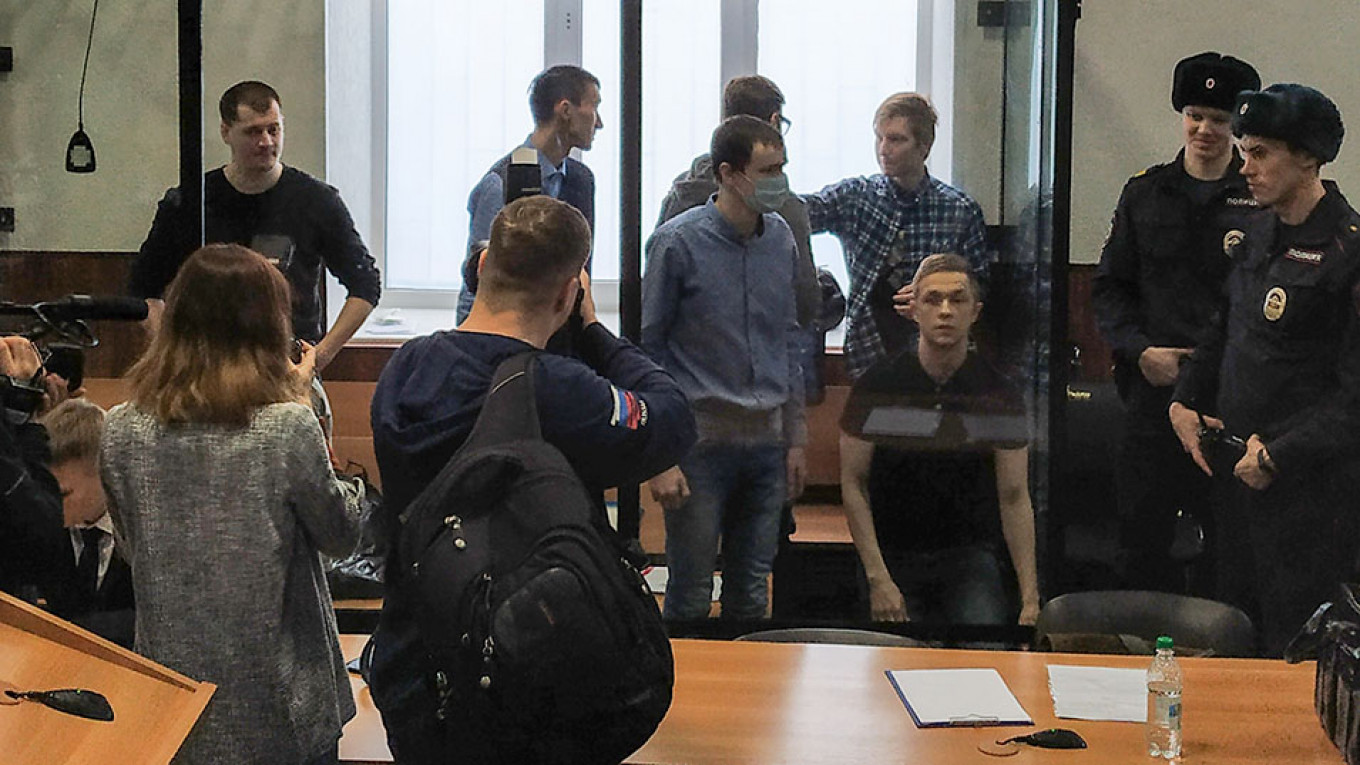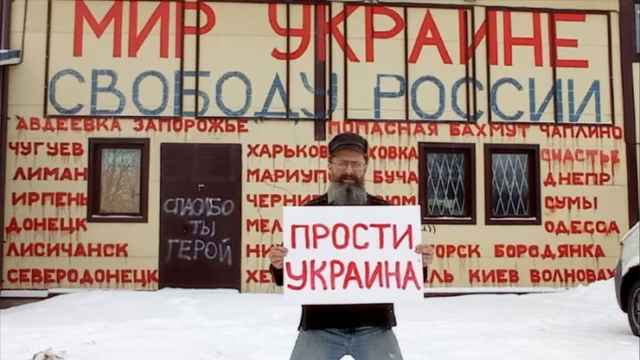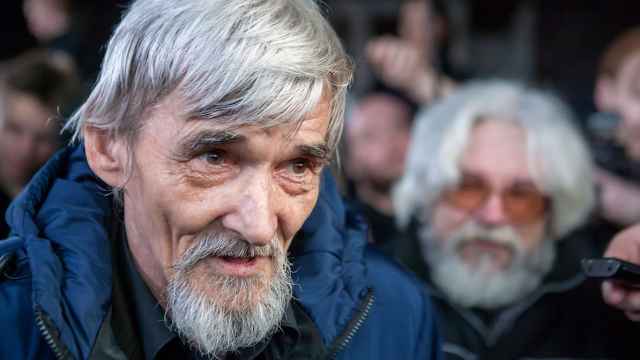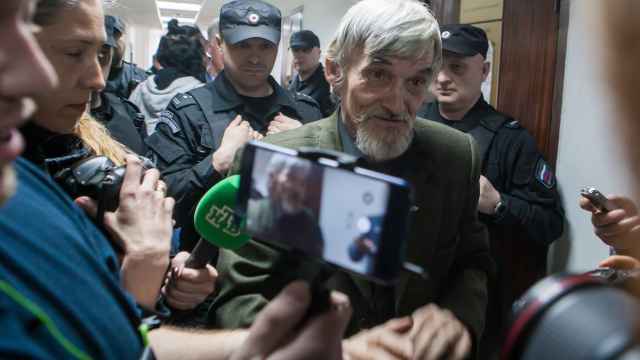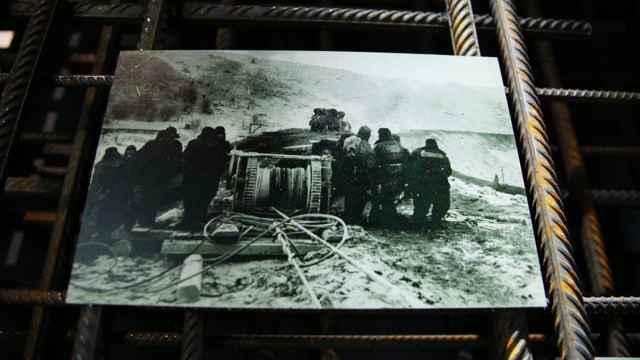On Monday, a court in central Russia jailed members of an anti-fascist activist group Set — Russian for “Network” — for up to 18 years on terrorism charges.
The seven young members of the group were arrested in the city of Penza in 2017.
Back then, investigators accused them of planning attacks during the 2018 presidential election and football World Cup. However, human rights defenders were quick to raise alarms and have said the charges of terrorism were fabricated. The accused themselves said they were severely tortured during the process.
We have to be absolutely clear here. An 18-year jail term for a 27-year-old who has neither killed, shot or beaten anybody, nor stolen billions — unlike most of the heroic representatives of various elites — is pure Stalinism.
This impression is only deepened by the authorities themselves, who hand out jail terms as if they were selling balloons: In this case a troika of judges in the Volga District military court gave the defendants prison sentences of 18, 16, 14, 10, nine, and six years. An NKVD-style troika, a military court, terrorists — this is a scene from 1937.
Why is it a Stalinist sentence? Because during the Khrushchev, and even Brezhnev eras, jail terms were far lower. Take any similar case at random, for instance, the 1963 sentence issued by the Supreme Court of the Belorussian SSR to three young “terrorists” who had allegedly set up an illegal organization “with the aim of achieving the establishment of a bourgeois-democratic republic in the U.S.S.R. using terrorist methods.”
This was a rather different case from the “Network Case.” The boys in 1963 were undermining the foundation of constitutional order with the goal of changing power in the country. In the Khrushchev era the sentence for such “crimes” was limited to eight to 10 years behind bars. Anti-Soviet agitation and propaganda was often punished with lesser terms than those given today for “inflicting moral suffering” on members of the police, or for throwing the notorious “plastic cups” in their direction.
Does this mean that the Soviet leadership during the Khrushchev Thaw and the subsequent stagnation under Brezhnev felt more confident than the current authorities?
The harshness of the sentences for the throwing of plastic cups and for organizing outdoor training, as the Network group did, is intended to demonstrate the state’s readiness to defend itself from any manifestations of dissatisfaction and dissent, even action that is not particularly vividly expressed.
FSB control
Primarily, of course, this is down to the FSB exercising control over affairs of this kind, along with cases of espionage and treason. It is as if the Lyubyanka headquarters is sending a signal to say “We are the constitutional order.”
And they are prepared to protect themselves and their beloved cronies using any means.
The disproportionate terms being handed out by the judges, the procedural violations and the claims of torture, to which the judiciary then turns a blind eye, the fabricated accusations — all of this testifies either to the complete subordination of the judges to the FSB, or to their professional degradation. Which, as it happens, is one and the same thing.
The sentences are harsh for one main reason: To dissuade others from doing the same thing.
If you really want to train, run and shoot, you can join the ranks of the Donbass fighters, the Cossacks with their whips, or the “Youth Army,” depending on your age. You can even join the Wagner mercenary army, and go off to kill and torture people. But God forbid that the thought might even occur to a young person that there’s something wrong with the country’s power structure, something unfair. If it does, they can expect a Stalinist troika and Stalinist jail terms.
Somewhere high up the Kremlin is amending the constitution, searching for ways to prolong the autocratic system. And at the very bottom of the system they are handing out sentences to the very young and wrecking their lives, some for two consecutive presidential terms, some for three.
A Message from The Moscow Times:
Dear readers,
We are facing unprecedented challenges. Russia's Prosecutor General's Office has designated The Moscow Times as an "undesirable" organization, criminalizing our work and putting our staff at risk of prosecution. This follows our earlier unjust labeling as a "foreign agent."
These actions are direct attempts to silence independent journalism in Russia. The authorities claim our work "discredits the decisions of the Russian leadership." We see things differently: we strive to provide accurate, unbiased reporting on Russia.
We, the journalists of The Moscow Times, refuse to be silenced. But to continue our work, we need your help.
Your support, no matter how small, makes a world of difference. If you can, please support us monthly starting from just $2. It's quick to set up, and every contribution makes a significant impact.
By supporting The Moscow Times, you're defending open, independent journalism in the face of repression. Thank you for standing with us.
Remind me later.



